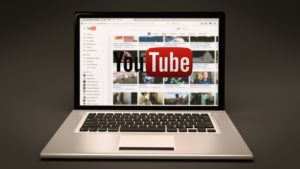- Calls to this hotline are currently being directed to Within Health, Fay or Eating Disorder Solutions
- Representatives are standing by 24/7 to help answer your questions
- All calls are confidential and HIPAA compliant
- There is no obligation or cost to call
- Eating Disorder Hope does not receive any commissions or fees dependent upon which provider you select
- Additional treatment providers are located on our directory or samhsa.gov
Potential Triggers in Following YouTube Vloggers

While blogging continues to be an expanding and growing field in the Internet space, “vlogging” has recently increased in popularity, particularly with the availability of live streaming video on social media, including Facebook, Twitter, Instagram and YouTube.
Live video and videos in general have become the new reality television, and “vloggers” or individuals who blog via video, have taken over the video scene.
In fact, studies have shown that teenagers in the United States are more likely to be influenced by a popular YouTube vlogger than they are by mainstream celebrities [1].
Navigating the Vlogging Scene While in Recovery
The combination of vlogging, live stream video, and Internet access readily available at our fingertips can make a recipe for disaster for those who might be in recovery from an eating disorder.
Falling into the trap of watching one video after another from a smartphone can happen easily, and a majority of time can be found spent consuming the ideas of others, including advertisers who have permeated the vlogging world. So what should you be aware of in your own recovery, and what are some ways to positively follow vloggers, if this is something you enjoy?
As with any social media platform, it is important to be mindful of your time spent on social media, who you follow, and how your time spent on social media is making you feel.
Researches have identified that frequently engaging on social media sites can increase negative moods and feelings of loneliness, depression, and frustration [2].
These types of emotions can be especially triggering for a person who is in recovery from an eating disorder, especially an individual who is learning to establish healthier coping mechanisms in lieu of eating disorder behaviors.
So when it comes to following vloggers, be it on Youtube or on any other social media platform, be selective of who or what you might be following.
 Triggers and Accounts that Can Be Triggering
Triggers and Accounts that Can Be Triggering
While it is not necessarily realistic to avoid everything that could be potentially triggering, there are some general guidelines you can follow to help you better navigate the vlogging scene. For example, avoid any vloggers that promote dieting, weight loss, or any other eating disorder behaviors. Consider filling your feed with people who are positive, encouraging, or who are solidly doing well in their own recovery.
If social media, including vlogging, seems to overwhelming right now, consider taking a break from it altogether! Whatever you need to do to keep yourself propelling in your recovery, find the strength and courage to make those decisions, and know social media will always be there whenever you feel ready.
 About the Author: Crystal is a Masters-level Registered Dietitian Nutritionist (RDN) with a specialty focus in eating disorders, maternal/child health and wellness, and intuitive eating. Combining clinical experience with a love of social media and writing, Crystal serves as the Director of Content and Social Media for Eating Disorder Hope/Addiction Hope, where her passion to help others find recovery and healing is integrated into each part of her work.
About the Author: Crystal is a Masters-level Registered Dietitian Nutritionist (RDN) with a specialty focus in eating disorders, maternal/child health and wellness, and intuitive eating. Combining clinical experience with a love of social media and writing, Crystal serves as the Director of Content and Social Media for Eating Disorder Hope/Addiction Hope, where her passion to help others find recovery and healing is integrated into each part of her work.
As a Certified Intuitive Eating Counselor, Crystal has dedicated her career to helping others establish a healthy relationship with food and body through her work with EDH/AH and nutrition private practice.
References:
[1]: Survey: Youtube stars more popular than mainstream celebs among US teens, http://variety.com/2014/digital/news/survey-youtube-stars-more-popular-than-mainstream-celebs-among-u-s-teens-1201275245/[2]: Stanford Medicine, “How Social Media Can Affect Your Mood”, http://scopeblog.stanford.edu/2014/10/03/how-social-media-can-affect-your-mood/
The opinions and views of our guest contributors are shared to provide a broad perspective of eating disorders. These are not necessarily the views of Eating Disorder Hope, but an effort to offer discussion of various issues by different concerned individuals.
We at Eating Disorder Hope understand that eating disorders result from a combination of environmental and genetic factors. If you or a loved one are suffering from an eating disorder, please know that there is hope for you, and seek immediate professional help.
Reviewed By: Jacquelyn Ekern, MS, LPC on March 7, 2017
Published on EatingDisorderHope.com

The EatingDisorderHope.com editorial team comprises experienced writers, editors, and medical reviewers specializing in eating disorders, treatment, and mental and behavioral health.

